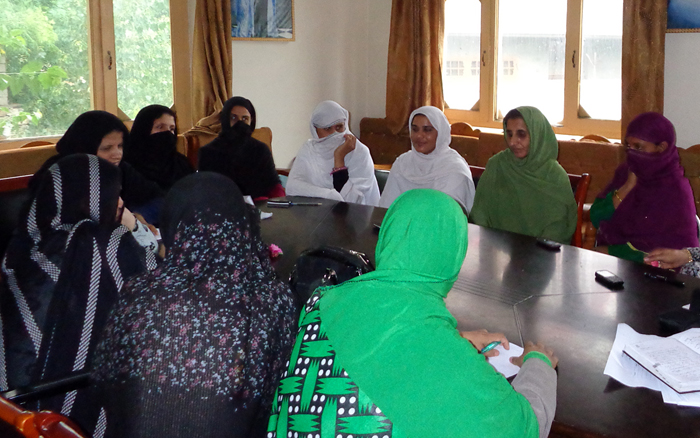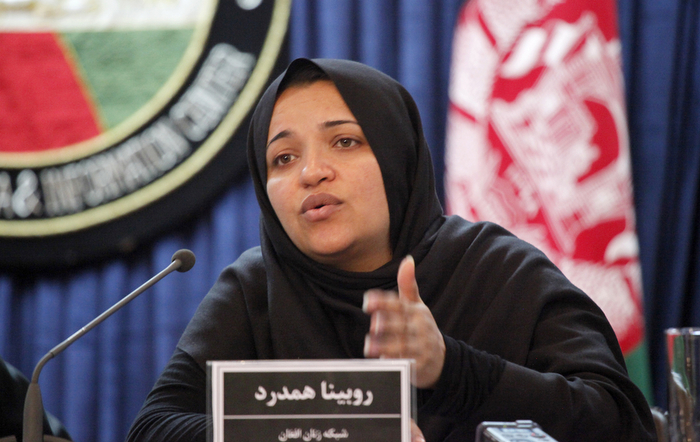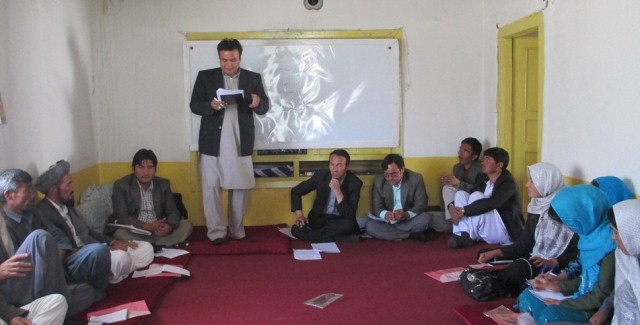KABUL - In a United Nations-backed report released today in the Afghan capital of Kabul, a group of Afghan civil society organizations called for a number of measures to be taken – including tackling widespread corruption, disarming and disempowering local militias and resolving ethnic tensions – in order to achieve a lasting peace in Afghanistan.“In this report, we see hope and fear among the people – hope on programmes, policies and laws that the government has introduced in the past, and fear about lack of implementation of these policies, programmes and laws,” said a senior advisor of the Afghanistan Independent Human Rights Commission (AIHRC), Mohammad Fahim Hakim, at a news conference organized to launch the report, entitled ‘Afghan People’s Dialogue on Peace: Building the Foundations for an Inclusive Peace Process.’
Produced by 11 civil society organizations and the AIHRC, the 40-page report is the second that summarizes the findings of a process known as the Afghan People’s Dialogue on Peace, which aims to promote an inclusive peace process by giving voice to the views of ordinary Afghans on critical issues that impact their lives most.
Based on 189 focus group discussions, opinion surveys and individual interviews conducted between April 2013 and January 2014, and summarizing the views of 4,648 Afghan men, women and youth from all walks of life throughout Afghanistan’s 34 provinces, the report documents their grievances, aspirations, and proposed solutions to achieve sustainable peace in Afghanistan.
The UN Assistance Mission in Afghanistan (UNAMA) facilitated Afghan civil society in obtaining the views of ordinary Afghans’. Those participating in the discussions included teachers, housewives, local business people, farmers, students, community elders and religious leaders, youth, and former members of the armed opposition (ex-Taliban).
One of the speakers at the report launch event on Tuesday was Rabina Hamdard of a civil society group, the Afghan Women's Network. Photo: Farhad Tabesh / UNAMA
---------------------------------------------------
The report contains a 10-point road map for peace, and calls on the two Presidential candidates – Dr. Abdullah Abdullah and Dr. Ashraf Ghani – in this Saturday’s second round run-off elections “to endorse and include the road map in any national strategy for the country’s development and stabilization.”
“The Afghan Peoples Dialogue on Peace reflects the views of often marginalized Afghans, including those in rural and remote areas, as well as women and youth,” the UN Secretary-General’s Special Representative for Afghanistan and head of UNAMA, Ján Kubiš, said in a news release welcoming the report.
“Afghans not only considered the armed insurgency a driver of conflict, but also other issues such as poverty, joblessness, the presence of warlords, corruption and violations of human rights. This report offers recommendations to address these problems,” said Mr. Hakim.
A common theme echoed throughout the Dialogue discussions and detailed in the report was “Afghans’ discontent with their Government due to corruption, weak rule of law and pervasive impunity for human rights violations.”
“These factors were viewed as the main drivers of the armed conflict. The report noted that corruption offers a ‘path to influence’ and that impunity is a direct by-product of corruption in the justice system,” the report stated in its findings.
Participants at one of 189 focus group discussions held in eastern Afghan province of Kunar. Photo: Shafiqullah Waak / UNAMA
---------------------------------------------------
The director of UNAMA’s Human Rights Unit, Georgette Gagnon, described the discussions that formed part of the report as “an important, inclusive rights-based peacebuilding initiative.”
“Policymakers should ensure that Afghan men, women and youth are meaningfully included in the peace process and have a real say in the future direction of their county,” said Ms. Gagnon. “We call on the future leader of Afghanistan to listen to the people’s views and the solutions they propose and incorporate them into all efforts aimed at stabilizing and developing the country.”
The first phase of the Afghan People’s Dialogue on Peace involved 1,526 Afghans through 78 focus group discussions held in 31 of Afghanistan’s 34 provinces. The findings of the Dialogue were published in a report, ‘Afghan People’s Dialogue on Peace: Laying the Foundations for an Inclusive Peace Process’ in December 2011. The second phase of the People’s Dialogue was launched in April 2013. As in the first phase, phase II was implemented with the aim of promoting an inclusive, transparent and accountable peace process by obtaining ordinary Afghans’ views on the future direction of their country.
The latest report has also called for ending impunity among the police and judiciary; resolving ethnic tensions, tribal disputes and factional conflicts which fuel broader armed conflict; respecting human rights and providing equitable development assistance and service delivery across Afghanistan.
Participants at another focus group discussions held in central Afghan province of Bamyan. Photo: Jaffar Rahim / UNAMA
---------------------------------------------------
In a separate news release, the civil society organizations today said that the dialogues and discussions enable them to act as a bridge between the Government and the people.
“Through this report we are carrying the people’s voices to our future president and giving ordinary Afghans – men, women and youth, from all walks of life – a real stake in the future development of this country,” the organizations said in the news release. “Road maps for peace based on the people’s vision are the only real guarantee of lasting peace in Afghanistan.”








